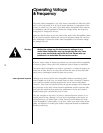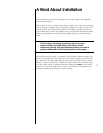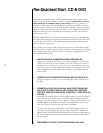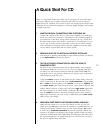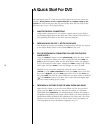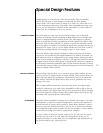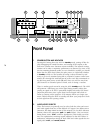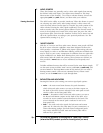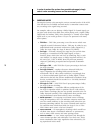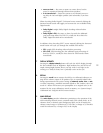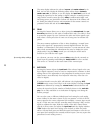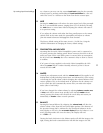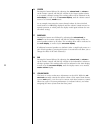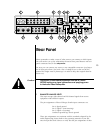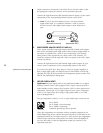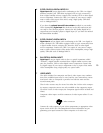
18
in order to protect the system from possible damage), simply
select a non-recording source on the record path.
6 SURROUND MODE
Pressing this button cycles among the various surround modes of the AVP2.
Note that the list of available surround modes is somewhat context-sensi-
tive, according to the signal being received.
For example: when you are playing a Dolby Digital 5.1 channel signal, you
are given only choices that make sense when playing such a signal (Dolby
Digital with and without THX); when listening to a “normal” stereo digital
signal such as you would get from a CD, you are presented with many
more options.
• THX Ultra — THX Ultra processing is used for movies which were
originally created for theatrical release; THX may be added to any
multichannel mode associated with movies (Dolby Digital/AC-3,
Dolby Pro Logic, Dolby Pro Logic II Movie, DTS, MPEG).
• Pro Logic — manually selecting Pro Logic may be needed when
listening to a conventional (PCM) digital signal, as from a
laserdisc player, which does not have an identifying “flag” to indi-
cate whether it is simply stereo, or Dolby Surround encoded. (In
the case of AC-3, DTS, or MPEG, the AVP2 will know positively
what sort of decoding is required and will provide it automati-
cally.)
• Pro Logic + THX — adds THX Ultra II post processing to the basic
Pro Logic decoding.
• Pro Logic II Movie — employs the more advanced Dolby Pro
Logic II algorithm for decoding Dolby-encoded movie
soundtracks. “DPL II” often yields sound that is surprisingly close
to a discrete multichannel signal such as Dolby Digital 5.1 from
older movies that lack the discrete multichannel soundtrack. (Note
that the soundtrack should be encoded as a “2.0 Dolby Surround”
signal for best results.)
• Pro Logic II + THX — adds THX Ultra II post-processing to Dolby
Pro Logic II Movie decoding.
• Pro Logic II Music— a somewhat different configuration of the
Pro Logic II algorithm which is optimized for use with ordinary
stereo music recordings (that are not specially encoded to the 2.0
Dolby Surround standard). This configuration often provides stun-
ning multichannel sound from ordinary stereo recordings.
• stereo surround — for enjoying two-channel stereo recordings
using all loudspeakers; this is an ambience extraction mode that
uses the natural ambience in the recording itself, rather than syn-
thesizing something artificial. The stereo surround mode tends to
be somewhat more subtle than Dolby Pro Logic II. Use it if the
PDL II Music mode seems a bit heavy-handed.
• mono surround — for monophonic recordings which would ben-
efit from some degree of additional ambience or spaciousness,
such as many classic movies and some sporting events.
• mono on center — a “true” mono, reproduced only through the
center channel speaker (and subwoofer, if you have one). Noisy
mono soundtracks often enjoy significant noise reduction by be-
ing reproduced in this mode.



